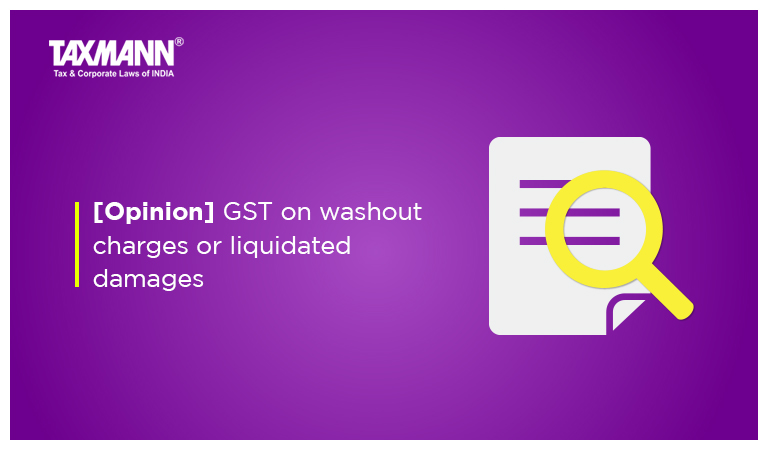[Opinion] GST on washout charges or liquidated damages
- Blog|News|GST & Customs|
- 2 Min Read
- By Taxmann
- |
- Last Updated on 21 September, 2022

M.S.Venu Gopal – [2022] 142 taxmann.com 363 (Article)
What is Washout charge?
“A sum equivalent to difference between the settlement rate (market rate) and the rate as agreed in contract”.
It’s discretionary upon the both parties of the contract to settle/close/washout the unexecuted contract at the rate fixed by it. In this regard, on mutual agreement, the rates which contracts settles is usually the market rate. In case of ‘Closure’ or ‘washout’ of aforesaid contracts, the party to the contract which opts for such closure is required to pay the other party a sum of equivalent to difference between the settlement rate (market rate) and the rate as agreed in contract.
What is Liquidated Damages?
‘Liquidated Damages’ means a compensation specified under the contract agreed between the parties for an estimated loss and which is required to be paid upon failure of either party to perform its obligations.
Section 7 Schedule II Para 5( e ) reproduced here under.
Schedule II, Section 7:- Activities to be treated as supply of goods or supply of services.
“As per the provisions laid down under section 7 of the CGST Act, the expression “supply” includes all forms of supply of goods/services for a consideration by a person in the course and furtherance of business.
Para 5 (e):-Agreeing to the obligation to refrain from an act, or to tolerate an act or a situation, or to do an act; and
Perusal of the aforesaid Schedule II entry makes it amply clear that in order to invoke the above taxable activity, there needs to be an agreement to tolerate a situation. This is not the case of washout such as contractual penalties, liquidated damages / cancellation fee etc.
The understanding of the learned adjudicating authority seems contradictory to the commercial understanding because –
-
- These washout charges arise on mutual acceptance of both parties on account of an ‘unintentional occurrence‘ which both parties actually intend to avoid.
- Damages/cancellation charges/ washout charges are provided for with an intent to ensure due performance of an agreement or to further obedience of the law.
- It is an expression of dissatisfaction or a form of penalty resulting from unsatisfactory performance or breach of the contract.
- Such washouts are not the desired result or intended to be a source of revenue for the receiving party but are incurred to compensate for loss suffered by one party upon the occurrence of an unintended event.
- Washout charges/damages are measures of compensation for breach / non-execution of contract due to conditions not under one’s control, but not a fee for agreeing to tolerate an act or situation.
- Washout charges result from failure to perform as per agreed terms.
- The very purpose of agreeing to payment of washout Charges is to ensure performance and not for tolerating non-performance.
- A contract is never entered into with an intent of non-performance or to tolerate non-performance.
- Washout Charges are not the desired income or Expense or result of contract but are compensation for the loss suffered by receiving party.
- A contract can never be read as agreeing to breach of the contract.
Click Here To Read The Full Article
Disclaimer: The content/information published on the website is only for general information of the user and shall not be construed as legal advice. While the Taxmann has exercised reasonable efforts to ensure the veracity of information/content published, Taxmann shall be under no liability in any manner whatsoever for incorrect information, if any.

Taxmann Publications has a dedicated in-house Research & Editorial Team. This team consists of a team of Chartered Accountants, Company Secretaries, and Lawyers. This team works under the guidance and supervision of editor-in-chief Mr Rakesh Bhargava.
The Research and Editorial Team is responsible for developing reliable and accurate content for the readers. The team follows the six-sigma approach to achieve the benchmark of zero error in its publications and research platforms. The team ensures that the following publication guidelines are thoroughly followed while developing the content:
- The statutory material is obtained only from the authorized and reliable sources
- All the latest developments in the judicial and legislative fields are covered
- Prepare the analytical write-ups on current, controversial, and important issues to help the readers to understand the concept and its implications
- Every content published by Taxmann is complete, accurate and lucid
- All evidence-based statements are supported with proper reference to Section, Circular No., Notification No. or citations
- The golden rules of grammar, style and consistency are thoroughly followed
- Font and size that’s easy to read and remain consistent across all imprint and digital publications are applied



 CA | CS | CMA
CA | CS | CMA
